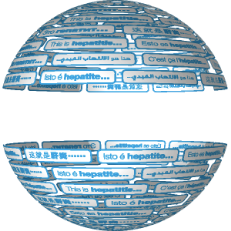 Noting that an estimated 400 million people around the world are infected with hepatitis B or C, the United Nations health agency is encouraging countries to increase hepatitis testing and improve access to health services and medicines for people afflicted with the disorders.
Noting that an estimated 400 million people around the world are infected with hepatitis B or C, the United Nations health agency is encouraging countries to increase hepatitis testing and improve access to health services and medicines for people afflicted with the disorders.
 “The world has ignored hepatitis at its peril,” said Dr. Margaret Chan, director general of the UN World Health Organization (WHO) in a press release. “It is time to mobilize a global response to hepatitis on the scale similar to that generated to fight other communicable diseases like HIV AIDS and tuberculosis.”
“The world has ignored hepatitis at its peril,” said Dr. Margaret Chan, director general of the UN World Health Organization (WHO) in a press release. “It is time to mobilize a global response to hepatitis on the scale similar to that generated to fight other communicable diseases like HIV AIDS and tuberculosis.”
According to the UN, the number of people who have hepatitis B or C is greater than 10 times the number of those infected with HIV. Only about 1 in 20 people with viral hepatitis know they’re infected, and just 1 in 100 people afflicted with the disease are being treated.
In May, the World Health Assembly — WHO’s decision-making body — called for treatment of 8 million people with hepatitis B or C by 2020, which the agency estimates would reduce new viral hepatitis infections by 90 percent, and decrease the number of hepatitis deaths by 65 percent in 2030 compared with the 2016 toll — targets that are part of the draft Global Health Sector Strategy on viral hepatitis.
This is the first-ever global health sector strategy on viral hepatitis, as an element of achieving the 2030 Agenda for Sustainable Development. The draft covers the first six years of the post-2015 health agenda, 2016–2021, building on the Prevention and Control of Viral Hepatitis Infection: Framework for Global Action published in 2012, and on two viral hepatitis resolutions adopted by the World Health Assembly in 2010 and in 2014. The strategy addresses all five hepatitis viruses (hepatitis A, B, C, D and E), with a particular focus on hepatitis B and C due to the relatively greater public health burden they represent.
 “We need to act now to stop people from dying needlessly from hepatitis,” said Dr. Gottfried Hirnschall, WHO’s director of the HIV Department and Global Hepatitis Program.
“We need to act now to stop people from dying needlessly from hepatitis,” said Dr. Gottfried Hirnschall, WHO’s director of the HIV Department and Global Hepatitis Program.
 These comments are being made before World Hepatitis Day, marked annually on July 28. This year’s theme, “Know Hepatitis, Act Now” encourages people to get tested and demand treatment. World Hepatitis Day 2016 also unveils the first World Health Organization’s Global Strategy for Viral Hepatitis, which sets a goal of eliminating viral hepatitis as a public health threat by 2030.
These comments are being made before World Hepatitis Day, marked annually on July 28. This year’s theme, “Know Hepatitis, Act Now” encourages people to get tested and demand treatment. World Hepatitis Day 2016 also unveils the first World Health Organization’s Global Strategy for Viral Hepatitis, which sets a goal of eliminating viral hepatitis as a public health threat by 2030.
Hepatitis B and C are both transmitted through contaminated blood, as well as through contaminated needles and syringes in healthcare settings and shared among intravenous drug abusers. The viruses can also be transmitted via unsafe sex and from an infected mother to her newborn child. While vaccine and treatments exist for hepatitis B, there is no vaccine for hepatitis C.
One strategy some countries employ in efforts to curb hepatitis infection rates is lowering prices of hepatitis C medicines. For example, WHO reports that in Egypt the price of these drugs fell from about $900 in 2014 to $200 in 2016 as a result of increased access to generic drugs. Brazil and Pakistan also expanded treatment coverage, and the country of Georgia planned to eliminate the disease entirely.
NOhep, a global movement to eliminate viral hepatitis, will be launched on World Hepatitis Day to bring people together and provide a platform for them to speak out, become engaged, and take action to ensure global commitments are met and viral hepatitis is eliminated by 2030. For more information, visit: http://www.nohep.org/

